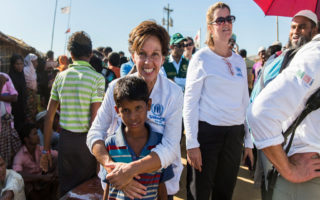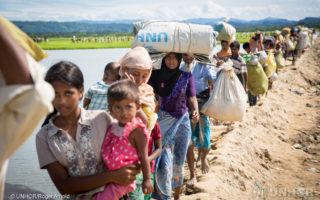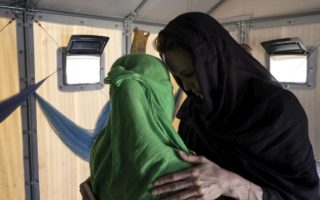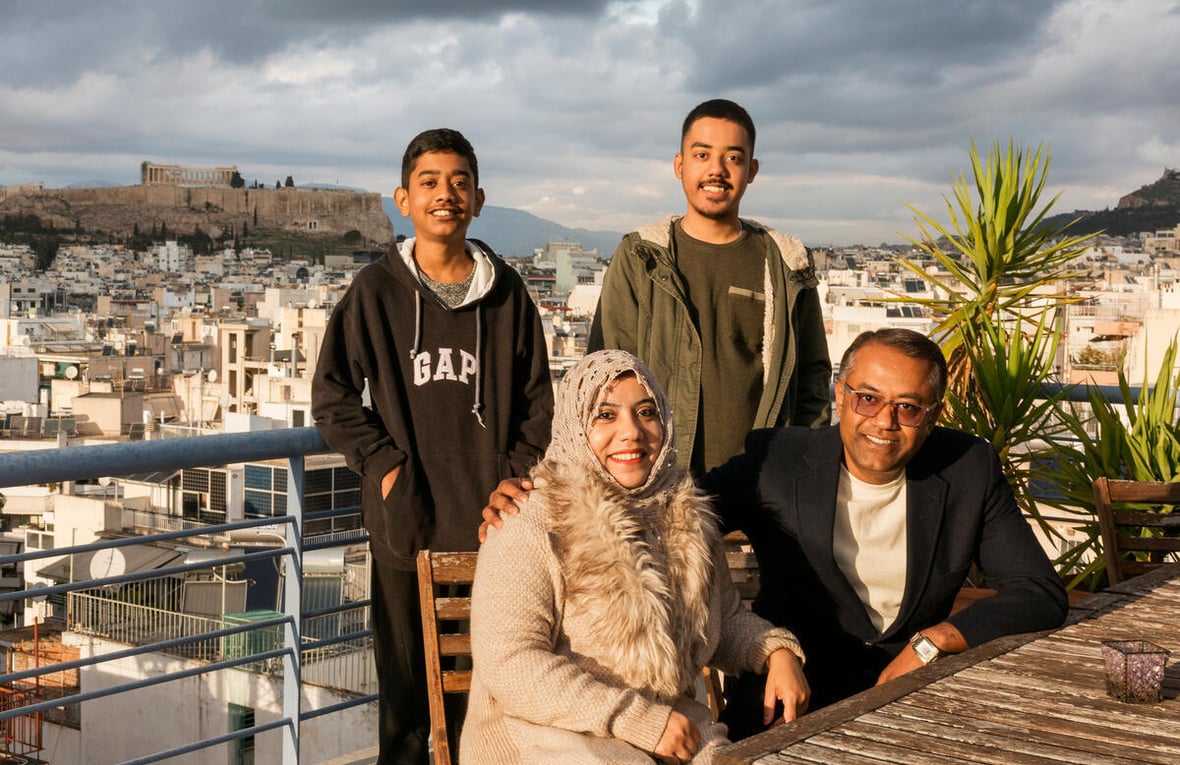
Rohingya refugee Mahmoud Suji, with his wife Maryam, and their two sons, Maher (right) and Mahdi (left), at a friend’s house in Athens, Greece. © UNHCR/Achilleas Zavallis
With legal support, a Rohingya refugee family were able to realize their right to be reunited, but funding cuts will deny such support to other families desperate to be together
By Maria Kouzinopoulou in Athens, Greece
Just hours before the start of 2025, the Suji family celebrated the New Year in Athens with immense joy. After nearly a decade of separation, Mahmoud, Maryam, and their two sons, Maher and Mahdi, were finally together again – filled with hope for the future.
Although born in Myanmar, Mahmoud, Maryam, and their sons – now 18 and 14 – are classified on their official documents as “stateless”. As members of the persecuted Rohingya ethnic minority, they remain invisible to a country that neither recognizes them as citizens nor protects them. Lacking legal status or identity documents, they faced significant challenges throughout their lives in Myanmar: they were denied access to education, health care, social support, and other public services. They were even restricted from moving beyond the limits of their village.
“We may have been born in Myanmar, and lived all our lives there, but we don’t really belong to it,” said Mahmoud.
In 2016, as persecution against the Rohingya escalated, Mahmoud was forced to flee. He first moved to Bangladesh but continued his journey in search of safety and stability, eventually arriving in Greece in October 2017.
“I knew nothing about Greece before arriving, but I felt that I could live a life of freedom here – a life with my family,” he recalled.
His wife and children were constantly in his thoughts throughout his journey. Along with hundreds of thousands of Rohingya, they had fled to Bangladesh during a massive wave of violence that broke out in Myanmar’s Rakhine State in August 2017.
Immediately after receiving refugee status in Greece in the summer of 2019, Mahmoud applied for family reunification so his wife and children could join him in a safe and legal way. What he did not expect was a five-year wait.
A complex process
Throughout this long and often uncertain process, Mahmoud was supported by the Greek Council for Refugees (GCR), which implements a legal assistance programme in partnership with UNHCR, the UN Refugee Agency.
Under both Greek and European law, refugees have the right to reunite with their spouses and children under 18 if certain conditions are met. And yet, realizing this right is often fraught with obstacles and delays. For Mahmoud, being stateless made the process even more complex. He was required to submit travel documents for his wife and children – documents they had never held and could not obtain due to their status.
“The challenges faced by stateless people affect every aspect of their lives,” explained Lydia Bolani, Senior Solutions Associate with UNHCR Greece. “Without recognition from any state, they struggle at every turn simply because they can’t obtain identification documents.”
It took a prolonged legal battle by the GCR lawyers, including taking the case to the European Court of Human Rights, to help secure a positive outcome for the Suji family. Ultimately, it was a collective effort involving not only GCR and UNHCR, but also significant support from the International Committee of the Red Cross (ICRC) and the International Organization for Migration (IOM), which helped the family obtain emergency travel documents and permission to leave Bangladesh.
Eleni Kagiou and Chara Katsigianni, the GCR lawyers who supported the family throughout these years, recalled how Mahmoud remained calm, even in the face of so many delays, and how visibly his confidence grew when the positive decision finally arrived.
“Family reunification is a crucial step for integration. You can’t truly rebuild your life when half your soul is still far away,” said Eleni.
“This process enables refugees’ family members to move through safe and legal pathways, so they aren’t forced to risk their lives in dangerous journeys,” added Chara.
Funding cuts threaten family reunion
GCR and UNHCR are advocating for legislative reforms that would accelerate procedures and allow for more flexible solutions to address the challenges refugees face when trying to reunite with their families.
See also: Around 1 million refugees access legal routes to safety and brighter futures over five years
The Suji family’s long-awaited reunion is the subject of a new documentary by Greek filmmaker, Alexia Tsouni, who followed their journey and the obstacles they faced as members of the Rohingya minority. During filming in Bangladesh, young Mahdi gave Alexia a painting showing his father on one side and the rest of the family on the other. He asked her to deliver it to Mahmoud, who burst into tears upon receiving it. The documentary’s title “Family Painting” was inspired by that moment.
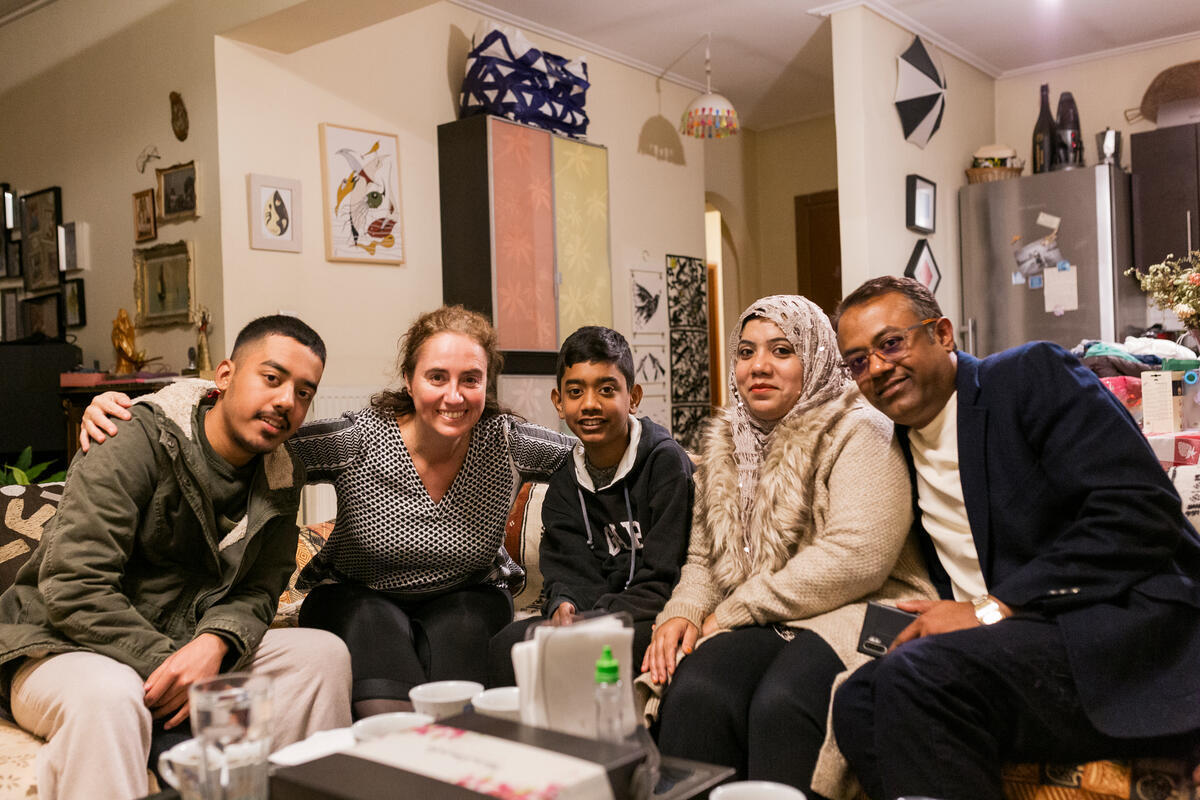
The Suji family visiting their friend Alexia Tsouni, a Greek filmmaker who made a documentary about their family reunion journey. From left to right: Maher, Alexia, Mahdi, Maryam and Mahmoud. © UNHCR/Achilleas Zavallis
“I am so glad that the documentary has a happy ending. My motivation for making films is to give hope, so I choose stories that, despite the immense suffering, end positively, thanks to solidarity, humanitarian efforts, and international organizations’ support,” said Alexia, who remains friends with the Suji family and is supporting their integration in Greece.
However, hope for other refugee families is increasingly at risk. With funding cuts shutting down vital services – including legal aid programmes like the one that helped Mahmoud – many families will be denied the chance to reunite with their loved ones. Without timely legal support, they risk remaining separated indefinitely or being forced to make unsafe journeys to be together.
For the Suji family, the happy ending is also a new beginning. They are now discovering life in Athens and making plans for the future. Mahmoud is preparing to get a motorcycle driving license, Maryam plans to take courses in hairdressing and make-up so she can find work, and Maher and Mahdi have enrolled in schools.
“Until now, my children and I had no future,” said Mahmoud. “Now I feel that we have found the safety and hope we were looking for, and that we belong in this country. We can now build our future here as a family.”
© UNHCR
Hope Away from Home: Protection and hope for people seeking safety
UNHCR’s Hope Away from Home campaign in Greece advocates for the protection of the right to family life for those who have sought safety in the country. A core priority of the campaign is to expand access to family reunification as a safe and legal pathway for refugees separated from their loved ones.
The legal assistance programme for refugee family reunification, implemented by the Greek Council for Refugees (GCR) in partnership with UNHCR, has supported 290 family reunification cases between 2021 and 2024. During this period, 145 people were successfully reunited with their families in Greece – often after years of uncertainty, waiting and hardship. These reunifications represent more than legal victories; they are moments of restored dignity and hope.
However, this critical work is now at risk. The current funding crisis faced by humanitarian organizations – including UNHCR – threatens to halt life-changing services such as legal support for refugee families. Without such support, families will remain separated, legal pathways will be blocked, and vulnerable individuals may be forced to resort to dangerous journeys.



